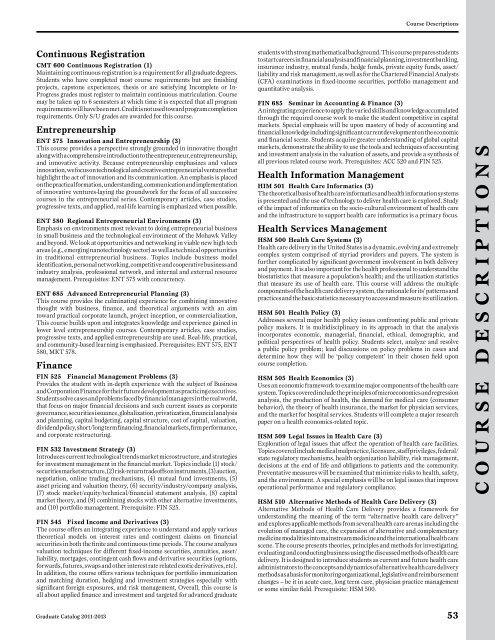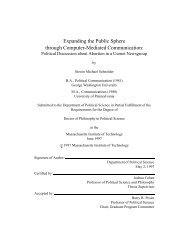COURSE DESCRIPTIONS - SUNY Institute of Technology
COURSE DESCRIPTIONS - SUNY Institute of Technology
COURSE DESCRIPTIONS - SUNY Institute of Technology
You also want an ePaper? Increase the reach of your titles
YUMPU automatically turns print PDFs into web optimized ePapers that Google loves.
Course Descriptions<br />
Continuous Registration<br />
CMT 600 Continuous Registration (1)<br />
Maintaining continuous registration is a requirement for all graduate degrees.<br />
Students who have completed most course requirements but are finishing<br />
projects, capstone experiences, thesis or are satisfying Incomplete or In-<br />
Progress grades must register to maintain continuous matriculation. Course<br />
may be taken up to 6 semesters at which time it is expected that all program<br />
requirements will have been met. Credit is not used toward program completion<br />
requirements. Only S/U grades are awarded for this course.<br />
Entrepreneurship<br />
ENT 575 Innovation and Entrepreneurship (3)<br />
This course provides a perspective strongly grounded in innovative thought<br />
along with a comprehensive introduction to the entrepreneur, entrepreneurship,<br />
and innovative activity. Because entrepreneurship emphasizes and values<br />
innovation, we focus on technological and creative entrepreneurial ventures that<br />
highlight the act <strong>of</strong> innovation and its communication. An emphasis is placed<br />
on the practical formation, understanding, communication and implementation<br />
<strong>of</strong> innovative ventures-laying the groundwork for the focus <strong>of</strong> all successive<br />
courses in the entrepreneurial series. Contemporary articles, case studies,<br />
progressive texts, and applied, real-life learning is emphasized when possible.<br />
ENT 580 Regional Entrepreneurial Environments (3)<br />
Emphasis on environments most relevant to doing entrepreneurial business<br />
in small business and the technological environment <strong>of</strong> the Mohawk Valley<br />
and beyond. We look at opportunities and networking in viable new high tech<br />
areas (e.g., emerging nanotechnology sector) as well as technical opportunities<br />
in traditional entrepreneurial business. Topics include business model<br />
identification, personal networking, competitive and cooperative business and<br />
industry analysis, pr<strong>of</strong>essional network, and internal and external resource<br />
management. Prerequisites: ENT 575 with concurrency.<br />
ENT 685 Advanced Entrepreneurial Planning (3)<br />
This course provides the culminating experience for combining innovative<br />
thought with business, finance, and theoretical arguments with an aim<br />
toward practical corporate launch, project inception, or commercialization,<br />
This course builds upon and integrates knowledge and experience gained in<br />
lower level entrepreneurship courses. Contemporary articles, case studies,<br />
progressive texts, and applied entrepreneurship are used. Real-life, practical,<br />
and community-based learning is emphasized. Prerequisites: ENT 575, ENT<br />
580, MKT 578.<br />
Finance<br />
FIN 525 Financial Management Problems (3)<br />
Provides the student with in-depth experience with the subject <strong>of</strong> Business<br />
and Corporation Finance for their future development as practicing executives.<br />
Students solve cases and problems faced by financial managers in the real world,<br />
that focus on major financial decisions and such current issues as corporate<br />
governance, securities issuance, globalization, privatization, financial analysis<br />
and planning, capital budgeting, capital structure, cost <strong>of</strong> capital, valuation,<br />
dividend policy, short/long term financing, financial markets, firm performance,<br />
and corporate restructuring.<br />
FIN 532 Investment Strategy (3)<br />
Introduces current technological trends market microstructure, and strategies<br />
for investment management in the financial market. Topics include (1) stock/<br />
securities market structure, (2) risk-return trade<strong>of</strong>fs on instruments, (3) auction,<br />
negotiation, online trading mechanisms, (4) mutual fund investments, (5)<br />
asset pricing and valuation theory, (6) security/industry/company analysis,<br />
(7) stock market/equity/technical/financial statement analysis, (8) capital<br />
market theory, and (9) combining stocks with other alternative investments,<br />
and (10) portfolio management. Prerequisite: FIN 525.<br />
FIN 545 Fixed Income and Derivatives (3)<br />
The course <strong>of</strong>fers an integrating experience to understand and apply various<br />
theoretical models on interest rates and contingent claims on financial<br />
securities in both the finite and continuous time periods. The course analyzes<br />
valuation techniques for different fixed-income securities, annuities, asset/<br />
liability, mortgages, contingent cash flows and derivative securities (options,<br />
forwards, futures, swaps and other interest rate related exotic derivatives, etc).<br />
In addition, the course <strong>of</strong>fers various techniques for portfolio immunization<br />
and matching duration, hedging and investment strategies especially with<br />
significant foreign exposures, and risk management, Overall, this course is<br />
all about applied finance and investment and targeted for advanced graduate<br />
students with strong mathematical background. This course prepares students<br />
to start careers in financial analysis and financial planning, investment banking,<br />
insurance industry, mutual funds, hedge funds, private equity funds, asset/<br />
liability and risk management, as well as for the Chartered Financial Analysts<br />
(CFA) examinations in fixed-income securities, portfolio management and<br />
quantitative analysis.<br />
FIN 685 Seminar in Accounting & Finance (3)<br />
An integrating experience to apply the varied skills and knowledge accumulated<br />
through the required course work to make the student competitive in capital<br />
markets. Special emphasis will be upon mastery <strong>of</strong> body <strong>of</strong> accounting and<br />
financial knowledge including significant current development on the economic<br />
and financial scene. Students acquire greater understanding <strong>of</strong> global capital<br />
markets, demonstrate the ability to use the tools and techniques <strong>of</strong> accounting<br />
and investment analysis in the valuation <strong>of</strong> assets, and provide a synthesis <strong>of</strong><br />
all previous related course work. Prerequisites: ACC 520 and FIN 525.<br />
Health Information Management<br />
HIM 501 Health Care Informatics (3)<br />
The theoretical basis <strong>of</strong> health care informatics and health information systems<br />
is presented and the use <strong>of</strong> technology to deliver health care is explored. Study<br />
<strong>of</strong> the impact <strong>of</strong> informatics on the socio-cultural environment <strong>of</strong> health care<br />
and the infrastructure to support health care informatics is a primary focus.<br />
Health Services Management<br />
HSM 500 Health Care Systems (3)<br />
Health care delivery in the United States is a dynamic, evolving and extremely<br />
complex system comprised <strong>of</strong> myriad providers and payers. The system is<br />
further complicated by significant government involvement in both delivery<br />
and payment. It is also important for the health pr<strong>of</strong>essional to understand the<br />
biostatistics that measure a population’s health; and the utilization statistics<br />
that measure its use <strong>of</strong> health care. This course will address the multiple<br />
components <strong>of</strong> the health care delivery system, the rationale for its’ patterns and<br />
practices and the basic statistics necessary to access and measure its utilization.<br />
HSM 501 Health Policy (3)<br />
Addresses several major health policy issues confronting public and private<br />
policy makers. It is multidisciplinary in its approach in that the analysis<br />
incorporates economic, managerial, financial, ethical, demographic, and<br />
political perspectives <strong>of</strong> health policy. Students select, analyze and resolve<br />
a public policy problem; lead discussions on policy problems in cases and<br />
determine how they will be ‘policy competent’ in their chosen field upon<br />
course completion.<br />
HSM 505 Health Economics (3)<br />
Uses an economic framework to examine major components <strong>of</strong> the health care<br />
system. Topics covered include the principles <strong>of</strong> microeconomics and regression<br />
analysis, the production <strong>of</strong> health, the demand for medical care (consumer<br />
behavior), the theory <strong>of</strong> health insurance, the market for physician services,<br />
and the market for hospital services. Students will complete a major research<br />
paper on a health economics-related topic.<br />
HSM 509 Legal Issues in Health Care (3)<br />
Exploration <strong>of</strong> legal issues that affect the operation <strong>of</strong> health care facilities.<br />
Topics covered include medical malpractice, licensure, staff privileges, federal/<br />
state regulatory mechanisms, health organization liability, risk management,<br />
decisions at the end <strong>of</strong> life and obligations to patients and the community.<br />
Preventative measures will be examined that minimize risks to health, safety,<br />
and the environment. A special emphasis will be on legal issues that improve<br />
operational performance and regulatory compliance.<br />
HSM 510 Alternative Methods <strong>of</strong> Health Care Delivery (3)<br />
Alternative Methods <strong>of</strong> Health Care Delivery provides a framework for<br />
understanding the meaning <strong>of</strong> the term “alternative health care delivery”<br />
and explores applicable methods from several health care arenas including the<br />
evolution <strong>of</strong> managed care, the expansion <strong>of</strong> alternative and complementary<br />
medicine modalities into mainstream medicine and the international health care<br />
scene. The course presents theories, principles and methods for investigating,<br />
evaluating and conducting business using the discussed methods <strong>of</strong> health care<br />
delivery. It is designed to introduce students as current and future health care<br />
administrators to the concepts and dynamics <strong>of</strong> alternative health care delivery<br />
methods as a basis for monitoring organizational, legislative and reimbursement<br />
changes – be it in acute care, long term care, physician practice management<br />
or some similar field. Prerequisite: HSM 500.<br />
<strong>COURSE</strong> <strong>DESCRIPTIONS</strong><br />
Graduate Catalog 2011-2013<br />
53
















